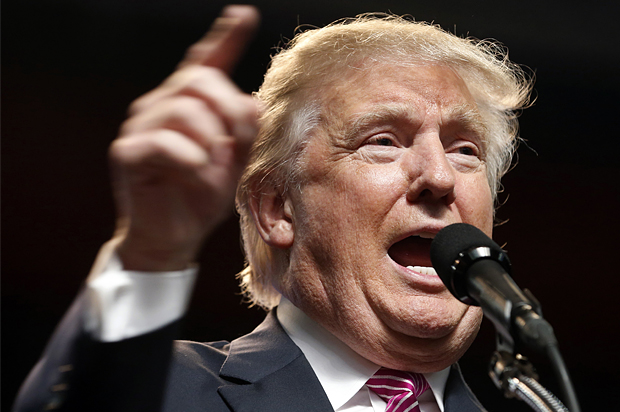Donald Trump is a better politician than a lot of people give him credit for. Granted, he often has no idea what he’s talking about, he contradicts himself on the regular, he has a repellent personality, he’s a misogynist and a bigot, and it feels like he stumbled ass-backwards into the Republican presidential nomination. But there are some things Trump does effectively on the campaign trail.
The best example of Trump’s political skill, I think, came in January after South Carolina Gov. Nikki Haley gave the Republican response to President Obama’s state of the union address. In that speech, Haley warned that “during anxious times, it can be tempting to follow the siren call of the angriest voices. We must resist that temptation.” Everyone rightly interpreted it as an attack on Trump, which Haley was quick to confirm, and it was taken as a sign that the Republican establishment was starting to put up resistance to its frontrunner. A couple of days later, Trump was asked about Haley’s statement at one of the debates, and here’s what he said:
TRUMP: She did say there was anger, and I could say “oh, I’m not angry.” I’m very angry, because our country is being run horribly. And I will gladly accept the mantle of anger. […] Our country is being run by incompetent people, and yes, I am angry. And I won’t be angry when we fix it. But until we fix it, I’m very, very angry. And I said that to Nikki. So when Nikki said that, I wasn’t offended. She said the truth.
So Trump took what was ostensibly an attack on his character from a “rising star” of his own party, and he flipped it around to turn it into an endorsement of his core message.
This came to mind as I read Alex Pareene’s piece on the anti-Trump messaging Hillary Clinton’s campaign and the Democratic National Committee are deploying in preparation for the general election. The Clinton campaign has determined that they’re going to attack Trump as a “loose cannon” who is too “risky,” while overall the Democrats are going to christen him “Dangerous Donald.” At first glance it seems like a fine enough way to ding Trump, but as Pareene notes: “The problem with that line of argument is that it’s Donald Trump’s argument for his candidacy: Conventional politicians and conventional politics haven’t worked—so take a gamble on the ultimate outsider.” And, as we’ve already seen, Trump has a talent for taking attacks like these and turning them to his advantage.
Don’t get me wrong – it’s well and good to present Trump as a dangerous figure because that’s what he is. I’ve made the case that Trump “dangerous” multiple times because it’s important to keep in mind that he represents a massive deviation from political norms and his policymaking would be informed by open hostility to certain segments of the population. But there’s a difference between giving Trump a silly nickname and demonstrating precisely the sort of danger he would represent.
This video, for example, from the Clinton campaign does a fine job of that. It uses Trump’s own words to make absolutely clear that he’d implement draconian policies aimed at immigrants, Muslims, and women while torturing detainees and killing innocent people.
Ultimately, the best way to go after Trump is to make him look like an incompetent weakling, given that he’s made “strength” and competence the cornerstones of his campaign. Republicans spent the entire primary trying to take down Trump by calling him a bully, or pointing out that he isn’t a true conservative, or tut-tutting him for using naughty language, and he just brushed it all off. It wasn’t until way too late in the game that any of them started attacking Trump for being a failed businessman and a fraud, which were the only attacks that really got under his skin and made him lose control on the debate stage. Trump probably relishes being called “dangerous,” but we know he can’t stand being called a failure.
It’s still very early in the campaign, which means the Clinton campaign has a luxury that desperate Republicans did not have: time to figure out which lines of attack work best. And, at the end of the day, Trump is still a long shot for the presidency. But Democrats should still be wary and not underestimate Trump’s political abilities. Nor should they give him openings to commandeer their own message and turn it against them.

